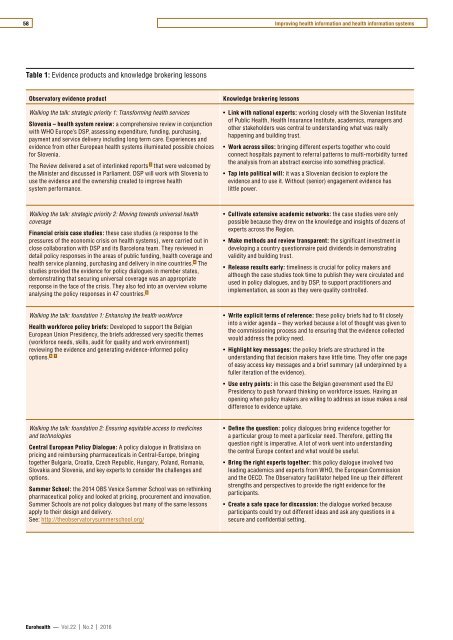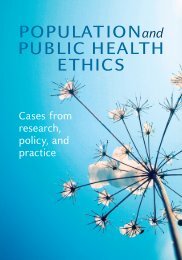EUROHEALTH
Eurohealth-volume22-number2-2016
Eurohealth-volume22-number2-2016
Create successful ePaper yourself
Turn your PDF publications into a flip-book with our unique Google optimized e-Paper software.
58<br />
Improving health information and health information systems<br />
Table 1: Evidence products and knowledge brokering lessons<br />
Observatory evidence product<br />
Walking the talk: strategic priority 1: Transforming health services<br />
Slovenia – health system review: a comprehensive review in conjunction<br />
with WHO Europe’s DSP, assessing expenditure, funding, purchasing,<br />
payment and service delivery including long term care. Experiences and<br />
evidence from other European health systems illuminated possible choices<br />
for Slovenia.<br />
The Review delivered a set of interlinked reports 3 that were welcomed by<br />
the Minister and discussed in Parliament. DSP will work with Slovenia to<br />
use the evidence and the ownership created to improve health<br />
system performance.<br />
Knowledge brokering lessons<br />
• Link with national experts: working closely with the Slovenian Institute<br />
of Public Health, Health Insurance Institute, academics, managers and<br />
other stakeholders was central to understanding what was really<br />
happening and building trust.<br />
• Work across silos: bringing different experts together who could<br />
connect hospitals payment to referral patterns to multi-morbidity turned<br />
the analysis from an abstract exercise into something practical.<br />
• Tap into political will: it was a Slovenian decision to explore the<br />
evidence and to use it. Without (senior) engagement evidence has<br />
little power.<br />
Walking the talk: strategic priority 2: Moving towards universal health<br />
coverage<br />
Financial crisis case studies: these case studies (a response to the<br />
pressures of the economic crisis on health systems), were carried out in<br />
close collaboration with DSP and its Barcelona team. They reviewed in<br />
detail policy responses in the areas of public funding, health coverage and<br />
health service planning, purchasing and delivery in nine countries. 4 The<br />
studies provided the evidence for policy dialogues in member states,<br />
demonstrating that securing universal coverage was an appropriate<br />
response in the face of the crisis. They also fed into an overview volume<br />
analysing the policy responses in 47 countries. 5<br />
• Cultivate extensive academic networks: the case studies were only<br />
possible because they drew on the knowledge and insights of dozens of<br />
experts across the Region.<br />
• Make methods and review transparent: the significant investment in<br />
developing a country questionnaire paid dividends in demonstrating<br />
validity and building trust.<br />
• Release results early: timeliness is crucial for policy makers and<br />
although the case studies took time to publish they were circulated and<br />
used in policy dialogues, and by DSP, to support practitioners and<br />
implementation, as soon as they were quality controlled.<br />
Walking the talk: foundation 1: Enhancing the health workforce<br />
• Write explicit terms of reference: these policy briefs had to fit closely<br />
into a wider agenda – they worked because a lot of thought was given to<br />
Health workforce policy briefs: Developed to support the Belgian<br />
the commissioning process and to ensuring that the evidence collected<br />
European Union Presidency, the briefs addressed very specific themes<br />
would address the policy need.<br />
(workforce needs, skills, audit for quality and work environment)<br />
reviewing the evidence and generating evidence-informed policy<br />
• Highlight key messages: the policy briefs are structured in the<br />
options. 6 7 understanding that decision makers have little time. They offer one page<br />
of easy access key messages and a brief summary (all underpinned by a<br />
fuller iteration of the evidence).<br />
• Use entry points: in this case the Belgian government used the EU<br />
Presidency to push forward thinking on workforce issues. Having an<br />
opening when policy makers are willing to address an issue makes a real<br />
difference to evidence uptake.<br />
Walking the talk: foundation 2: Ensuring equitable access to medicines<br />
and technologies<br />
Central European Policy Dialogue: A policy dialogue in Bratislava on<br />
pricing and reimbursing pharmaceuticals in Central-Europe, bringing<br />
together Bulgaria, Croatia, Czech Republic, Hungary, Poland, Romania,<br />
Slovakia and Slovenia, and key experts to consider the challenges and<br />
options.<br />
Summer School: the 2014 OBS Venice Summer School was on rethinking<br />
pharmaceutical policy and looked at pricing, procurement and innovation.<br />
Summer Schools are not policy dialogues but many of the same lessons<br />
apply to their design and delivery.<br />
See: http://theobservatorysummerschool.org/<br />
• Define the question: policy dialogues bring evidence together for<br />
a particular group to meet a particular need. Therefore, getting the<br />
question right is imperative. A lot of work went into understanding<br />
the central Europe context and what would be useful.<br />
• Bring the right experts together: this policy dialogue involved two<br />
leading academics and experts from WHO, the European Commission<br />
and the OECD. The Observatory facilitator helped line up their different<br />
strengths and perspectives to provide the right evidence for the<br />
participants.<br />
• Create a safe space for discussion: the dialogue worked because<br />
participants could try out different ideas and ask any questions in a<br />
secure and confidential setting.<br />
Eurohealth — Vol.22 | No.2 | 2016
















